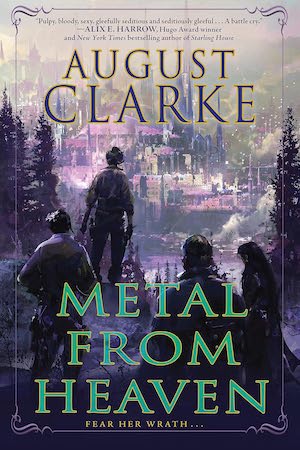How to describe august clarke’s new adult fantasy novel Metal from Heaven? Frenzied. Vicious. Lusty. Brutal. Unforgiving. Hallucinatory. Lurid. Gut-wrenching. Revolutionary. Relentless. Venomous. Provoking. Unabashedly queer. Fucking bonkers.
Marney’s story begins in death. Like others in the ichorite factory owned by entrepreneur-turned-tycoon Yann Industry Chauncey, the Honeycutts left their ruined homeland for the promise of economic opportunity in the big city. What they found instead were lies and suffering. Working in the factory processing ichorite, a mineral with magical properties that can be used in everything from fabric to armor to utensils to train cars, is soul-crushing, made worse when children born to those laborers are “lustertouched.” These kids are severely allergic to ichorite, and it’s killing them. As Marney ages, she discovers she also has the inexplicable ability to manipulate it, although it makes her feel like her brain is melting out of her ears when she does it. The Honeycutts lead the rest of the factory workers in a strike and are slaughtered for their efforts. Only young Marney survives.
Eventually Marney is collected by a group of bandits and rebels hiding away in an anarchist commune far from Chaunceyco. There she learns to see the world not just for what it is right now but what it could be. I don’t want to explain too much about the lavish world clarke has created or the riveting characters they filled it with. This is the kind of book that is best experienced first hand as clarke gradually peels back the onion layers. I’ll just say it is greater than the sum of its premise and doesn’t end the way you expect.
clarke writes in second person for most of the book, but the “you” who Marney talks to appears infrequently enough that it often feels first person POV. First person is extremely common in young adult, where clarke got their publishing start, but unusual in adult fantasy. It’s a challenge when you have readers used to third person omniscient and knowing what’s going on in the heads of the main characters who now only get to see through Marney’s lustertouched eyes. Keeping the focus tight on Marney’s conversation with “you” allows clarke to meander in the narrative more, to play with style and structure more, and to get lost in the wilderness that is Marney’s thoughts. Although the plot would’ve been tighter with third person omniscient, the story itself and the reading experience would’ve been much less interesting. It would’ve been yet another story about a bunch of rebels taking on an oppressive system.
Buy the Book

Metal from Heaven
The prose is, well, it’s astonishing. It’s the literary equivalent of biting into a ripe mango picked fresh off the tree or seeing a favorite piece of art in person for the first time. Take, for example, this description of Marney manipulating ichorite:
Nearness brought the suffering on before the fit even started. I ground my teeth, slapped my palms down, and jerked my hands backwards. The roof of the train clung to my palms. It peeled back like a blanket. Colors clapped, the world undulated and jellied around me, my tongue swelled, my gums went soft, my guts rigid, the sky was a whirl of orange and magenta molten poisonous candy pressing hard against my face. The world seethed around my body. A horrible delusion took me, and I imagined for a moment, imagined so concretely that my body responded with jitters and gooseflesh and appropriate recoil, that the ichorite roof had squeezed my hands, touched me like hands would touch me, or like how a sea anemone might wriggle around its little prey. Fucking ridiculous.
The way clarke writes mirrors the agony and ecstasy Marney feels when the luster explodes in her. She’s being born anew and dying all at once. clarke couldn’t get this level of harrowing nuance in third person.
There is subtext to the subtext, layers colliding into layers like the back of a piece of cross-stitch. There are bits of socialist and communist rhetoric, of leftist politics and anti-capitalism slogans, of understanding the difference between compromising your morals and building a coalition of people with different reasons and methods but the same goal, of realizing the world is bigger than your conservative upbringing let you think, of refashioning your relationship with religion after breaking free of its bigotry, of coming to terms with your queerness by seeing how it brushes up against the values you were raised with.
The term “crawly” is a good example of this. A crawly is kind of like our version of “queer;” it’s both an identity and a descriptive term, and it’s both a hurtful slur and a reclaimed status: “She and her crawlies, all of them crawlies, filthy rotten repulsive vile violent wicked depraved little crawlies, menaced upright women and harrowed polite society.” Marney is described as having “crawly hair” and her surprise at feeling energized, rather than disgusted, by that is a key moment in her character development. She explores her gender identity through the expansion of the term:
I sat at the bar sipping brown liquor with great care while an older girlcrawly, of the generation who said girlcrawly and boycrawly, of which I’d be a boycrawly, cut my hair.
Normally when I read books for review, I can get through them pretty quickly, but this took me weeks to finish. I’ve never read that slow in my life. It wasn’t that it was difficult to work through, more that I wanted to digest each sentence thoroughly before moving to the next. It was like getting a seven course meal prepared by a Michelin-star chef, then another, then another, and so on for seventeen glorious chapters. From their Scapegracers trilogy, I knew august clarke could write, but in Metal from Heaven it’s like oh shit, they can write write.
Metal From Heaven is published by Erewhon Books.
Read excerpts here and here.

